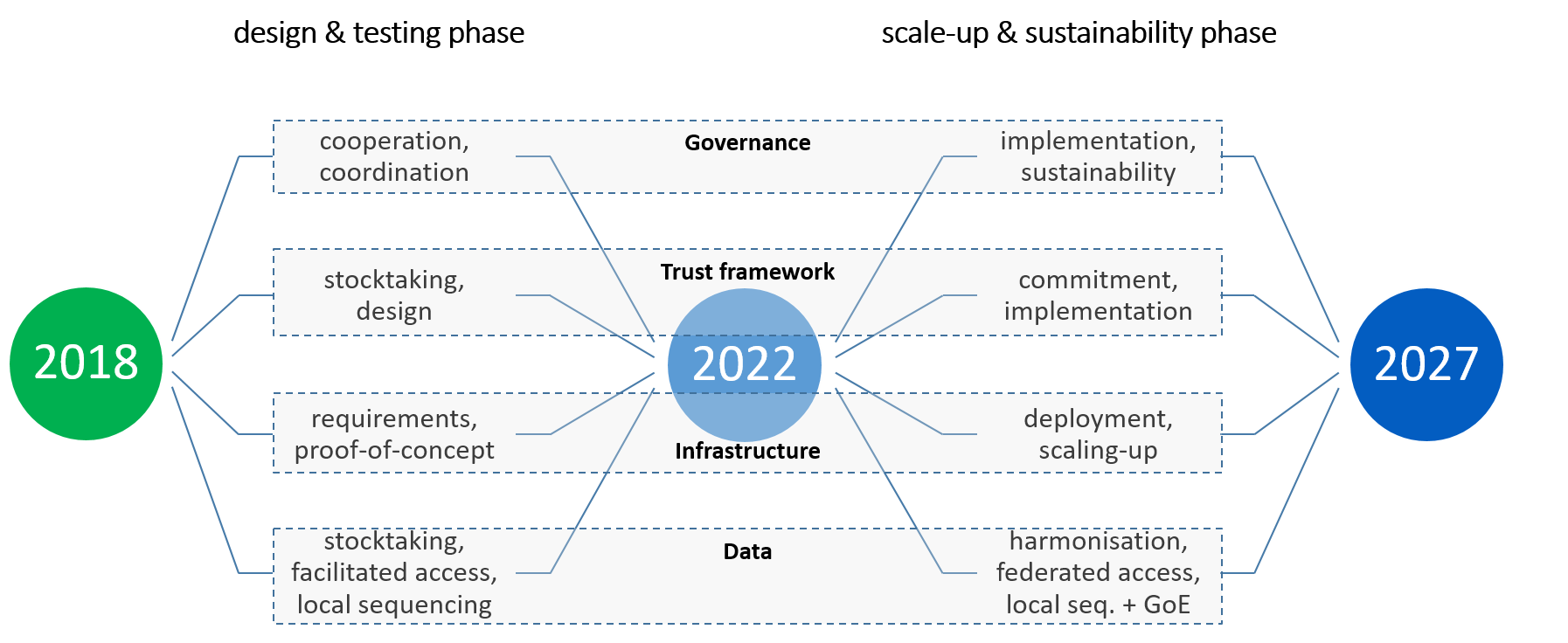As people's expectations of the government increase, South Korea embarked on a journey towards digital transformation, It embarked on a "Digital Platform Government" project that will provide civil services to citizens with minimal paperwork.
As people become increasingly dependent on technology, Access to digital services has become indispensable for governments that aspire to inclusive economic performance and stability for their citizens. It has to reach out to citizens and businesses. Don't ask them to access it.
Until late 2019, Most of the world's governments were seeking to improve their digital performance. Until 2020 brings a crisis that will transform digital governance from a luxury development into an urgent need. When the COVID-19 pandemic forced people to stay at home, Digital progress is no longer limited to their access to information, Rather, the concept has expanded to include health, legal, educational and commercial services that must be provided remotely and for different social and age groups.
In pursuit of an integrated digital government system, The Korean government has launched a new innovation strategy called "Digital Platform Government" to be led by the Ministry of Science and Information and Communications Technology.
Work began with the formation of a presidential committee comprising 19 special experts and 4 ministers to design a new form of government operations. so that it is people-centric, It is based on science and accurate data, Be transparent, It cooperates with the private sector, Every opportunity offered by digitization is seized.
This basic committee will consist of 6 small subcommittees, Covering several areas, From artificial intelligence and data to infrastructure, Then services, Innovation of work methods, And ending with the areas of the industrial ecosystem and information protection.
Over a period of 5 months, The committees have had more than 100 meetings, resulted in approximately 140 tasks to be accomplished, Experts will select priority tasks from them after conducting feasibility studies.
This platform will be integrated with the "Government 24" portal of the Ministry of Interior and Safety, which collects data, It will make most government data open source to support private companies in developing their products and services. After you repeal regulations and laws that impede access and use of data, and adopt a unified data model, and a policy for sharing anonymous information.
This platform will serve as a testing ground for the public and private sectors to collaborate in experimenting with any new innovation, Provided that experiments and decisions are data-driven. Therefore, The government is dedicated to establishing an innovative platform infrastructure and to enhancing connectivity between existing systems and enabling them to deliver services that meet people's growing expectations. This means that revolutionary technologies will be widespread, At the forefront of cloud computing, big data and artificial intelligence applications, It also means that an environment of trust prevails and ensures the security of information and that personal data is not misused or leaked, This is key to involving people in every step taken. It can be achieved by adopting advanced technologies, Such as blockchain, quantum cryptography, and the like.
At the same time, The Korean government shall take into account the green orientation and its commitments to climate change, So it works to green its economy, In 2020, it launched the New Korea Agreement, which will carry 160 trillion won worth of investments to generate nearly 2 million jobs by 2025.
But the digital transformation journey that began at the turn of the millennium posed a number of challenges. of the sheer number of IT system silos that have made the provision of integrated services tailored to the needs of individuals complicated, The different digital systems developed by each ministry and institution according to their needs and the expertise of their cadres, This has led to sharp divisions in business methods and made it more difficult to connect systems and exchange data between government entities.
For decades, The Korean government's efforts have proven beneficial, Every year, it ranks in the top three on the United Nations e-Government Development Index. Since 2010. It is also a leader in ICT infrastructures and open public databases.
Going forward, It is hoped that these updates will bring an increase in value, savings in the overall cost of the information system and a richer experience for users. In addition This shift will make cooperation between the public and private sectors, ministries and central authorities normal, This will eliminate the individual mechanisms of action for each government institution separately.
In a country where citizens, the private sector and government come together on a single platform, Services will be better, New value and a high degree of convergence and partnership will emerge.
With these objectives, The Korean government has built a future vision for this platform, It aspires to make it a global benchmark and success story worth sharing and spreading across countries.
References:
- https://www.weforum.org/agenda/2023/01/davos23-korea-digital-platform-government/
- https://www.msit.go.kr/eng/bbs/view.do?sCode=eng&mId=4&mPid=2&pageIndex=&bbsSeqNo=42&nttSeqNo=443&searchOpt=&searchTxt=
- https://pulsenews.co.kr/view.php?year=2022&no=285795
- https://www.dgovkorea.go.kr/service1/g2c_01/gov24
- https://www.koreatimes.co.kr/www/tech/2023/02/129_344616.html
- https://www.dgovkorea.go.kr/
- https://www.iea.org/policies/11514-korean-new-deal-digital-new-deal-green-new-deal-and-stronger-safety-net
- https://www.forbes.com/sites/markminevich/2022/10/29/digital-government-is-no-longer-an-option-it-is-an-imperative/?sh=30ed19a05d23
- https://www.weforum.org/events/world-economic-forum-annual-meeting-2023/sessions/special-address-by-yoon-suk-yeol-president-of-the-republic-of-korea






